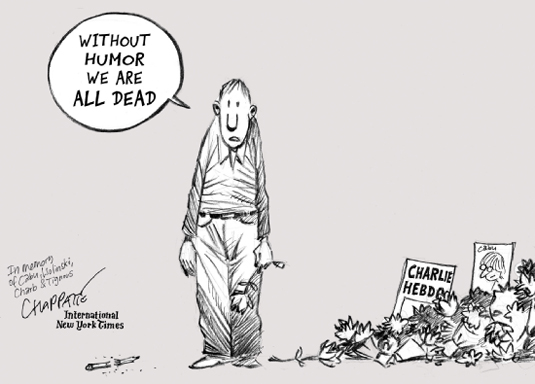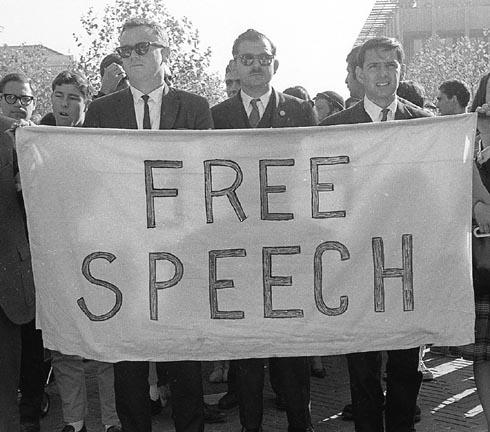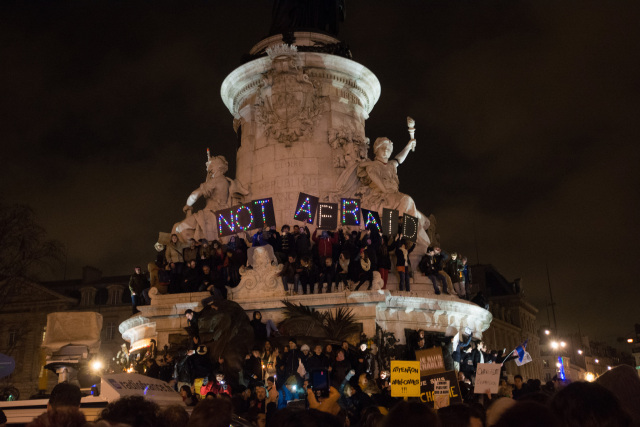“I was shocked to the core when I heard about the killings of 12 people at the offices of Charlie Hebdo,” writes a professor of cultural history in London. He may well be the only one.
 Less than a month ago, six Taliban psychopaths slaughtered over 130 children in Peshawar Pakistan. It was an act of staggering cruelty that had already been half-forgotten outside Pakistan when gunmen entered the offices of the satirical magazine in Paris on Wednesday.
Less than a month ago, six Taliban psychopaths slaughtered over 130 children in Peshawar Pakistan. It was an act of staggering cruelty that had already been half-forgotten outside Pakistan when gunmen entered the offices of the satirical magazine in Paris on Wednesday.
It comes down to context. If we resign to the political and media context of “the rising clash of civilizations between radical Islamists and the West,” then we see the world in their terms (both the Islamists and the ruling elites). And as citizens we continue to provide the fodder for them to continue to make their ‘global war’ a self-fulfilling prophecy.
We also contribute to the anti-Muslim, anti-immigrant bigotry that is sweeping Europe and America. Of course there’s the fact that war sells, and perpetual war is the gift to political, corporate and media elites that never stops giving. But when ordinary people quit buying, it will dry up.
Is “radical Islam the religious form through which a particular kind of barbarous political rage expresses itself,” or is the source of this worldwide nihilistic hatred a convergence of religious in the conventional sense and political in the all-politics-is-war sense?
The murdered Charlie Hebdo editors and cartoonists represented a brand of militant secular atheism that extreme Islamic religionists see as their mortal enemy in the context of war and clash of civilizations that so-called leaders in the West have promoted.
Instead of looking beyond the tired narrative of terrorism, cable news twits in the United States are asking today, “Could it happen here?” We don’t have to wait for the next cycle to find out, since we’ve already had Columbine, Virginia Tech and the Denver ‘Batman’ slaughters, to name just three. Of course those don’t fit the narrative, but are placed in a completely different context, which insures that we don’t get at the root and begin to understand either eruption of evil.
Does evil have the same psychological root, but merely takes different forms in different cultures? The growth of malevolence, whether by psychopathic terrorists or terrorizing psychopaths, has merged into one globalizing juggernaut, destroying the hearts of all but the strongest individuals worldwide.
It isn’t just Islamic extremists that are waving a black flag in our faces showing that the global society is in complete disorder. The depth of the disaffection, disenchantment and powerlessness of young men, not only in the Islamic world but in the West as well, is a primary source of the ‘lone wolf’ syndrome.
What the West refuses to see and grasp is that “spreading the values of democracy and freedom around the world” is exactly what many people around the world fear. They ask, ‘What kind of culture has your values of democracy and freedom produced when your children aren’t safe in their schools, when your women are marketing objects of sexual exploitation, when you export your hatred by invading other lands that are no threat to you?’
One of the men who acted out the evil in Pakistan spoke for all powerless people filled with nihilistic rage: “We want them to feel our pain.” Perhaps if more of us did, just a little, wherever we live, this spreading horror would begin to end, and we would begin to feel again, rather than carry on benumbed in our increasingly benighted societies.
After 9.11, America declared war on a small network disaffected terrorists, and thereby tremendously elevated and  proliferated them, and greatly diminished us. We followed the criminal Dick Cheney’s school of thought, which still rails against “criminalizing terrorists.” However if we had done so, there would not be so many young men in the Islamic world and in our midst fighting what they have been told by America and the West is a war.
proliferated them, and greatly diminished us. We followed the criminal Dick Cheney’s school of thought, which still rails against “criminalizing terrorists.” However if we had done so, there would not be so many young men in the Islamic world and in our midst fighting what they have been told by America and the West is a war.
The Enlightenment, which began and has dead-ended in France, supposedly freed the mind from the more diabolical dictates of belief. But reason and analysis never offered anything more than a flimsy barricade against the tides of human irrationality. The French Revolution should have proven that.
That doesn’t mean that the opposing intellectual movement of Romanticism was or is an adequate response, much less a retreat into nationality, belief and tradition. (On Monday, an organization called “Patriotic Europeans Against Islamization of the West” ominously assembled 18,000 marchers in Dresden, Germany.)
Islamic extremism is a reaction to the Western juggernaut, but the foundational premises of Western civilization, going back not just to 17th century France but 5th century BC Greece, can no longer give meaning and purpose even to people in the Judeo-Christian world. Nor is the importation of Buddhism, now so popular in America and Europe any answer either.
The destruction of the old and the creation of the new applies to human history as well as geological history. We are witnessing the destruction of the old without the creation of anything new, largely because the vast majority of people no longer believe it is possible for things to be any different.
The word ‘radical’ is often applied to Islamic extremists, but they aren’t radical at all. They are utterly conventional. Radical literally means ‘to go to the root.’ And obviously there has to be radical change, beginning within the individual. Not the homogenous dividuals of America and Europe, but the undivided human beings of the earth.
The choice between religious belief and secular reason is a false choice. Human beings have another capacity and we urgently need to fully awaken it within ourselves—the capacity for questioning and insight.
Martin LeFevre

